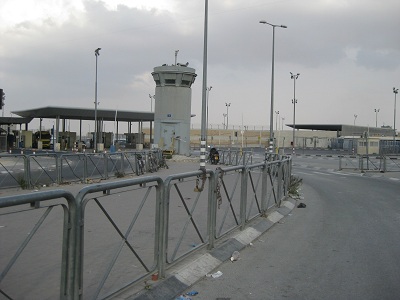
By Tamar Fleishman
It was announced on the noon news flashes that security forces had caught a terrorist at Qalandiya checkpoint. It was said that the man had tried to pass eight pipe bombs in his bag. It was reported that the terrorist had been taken for questioning, that the bombs were dismantled and that the checkpoint was closed.
The report was suspicious, why would a person who didn’t suffer from mental illness or that hadn’t been sent by the system to check the alertness of the soldiers, try to pass not one bomb, not two bombs, but eight (!) bombs, when every reasonable person knows that even coins in a man’s pocket, earrings on a woman, nails in a laborer’s shoes or belt buckles are detected by the sensitive machine and cause it to beep.
I don’t know whether it happened or not, I only know that closing the checkpoint and preventing people from passing for three hours is collective punishment which is prohibited by the international law. I also know that under the occupation the time of millions of Palestinians is expropriated from them and the obligation to give an explanation and to apologize falls on no one and on no authority, and neither is anyone held accountable for it.
And regardless of this, or rather in clear relation to it all, on the other side of the checkpoint, the Palestinian side, the war of teenagers against soldiers was in its midst, a war of stones against rifles. Over there the battle persists to exist without being reported on or publicized.
Over there the teenagers continue to attack the checkpoint and the soldiers that come out towards them with grenades and rifles, they aren’t deterred and don’t stop in face of the shooting and the gas.
It is evident that the Palestinian teenagers determine the intensity of the flames and the location of the battlefield, while the soldiers, who in spite of their being keen to fight, are restricted by orders. Unlike in the past, the soldiers were the ones to respond and not those to initiate.
At first the teenagers arrived from the hill towards which the wall ascends, they created a shaky barricade from a wooden board, behind which they found shelter and over which they threw stones and different kinds of bottles at the soldier. The soldiers got out of the checkpoint complex, crept along the wall and under the cover of gunshots and gas fumes they advanced, they moved the barrier and aimed at the teenagers. The battle continued until the soldiers’ commander arrived, an officer at the rank of second lieutenant who received notice through the radio and withdrew his men. The teenagers, pleased by their momentary victory, tailed those retreating and attacked. The soldiers, as though their pride suffered a blow, headed forward again and fired with more rage and force. And the teenagers opened additional fronts at which the soldiers’ fire was aimed as well. The soldiers didn’t take under consideration all those many people who were forced to cross the main road while tearing, chocking and having trouble breathing. And when a young woman who was caught at the front line with her baby as she was shading his face with a blanket, complained to the officer about the damage that the fire was causing her infant, he waved his hand at her and shouted with frustration: “you don’t want us to shoot?- tell them (the teenagers) not to throw stones…”.
And so in continual and interval pulses, the young Palestinians attacked and stopped, and then they attacked again and stopped for a few minutes, after which they attacked again.
When the day ended and darkness fell, the teenagers had yet to tire and things still had not settled. The army forces were replaced, new soldiers took to the posts, only the teenagers were the same ones, they attacked with determination, passion and rage, and the battle went on into the night.
It seemed that for the meanwhile, at least at Qalandiya, those fighting in the streets are the ones who have the final word.
And I personally had a moment of satisfaction during one of the breaks, when two students conversed with me, and Al-Hussane Taehr, the one amongst the two who spoke English, asked who I was and what and why was I there, and I told them, and they asked that I take their photo with the soldiers behind them and upload the picture to my Facebook account, so I did. And then, Taehr handed me a medallion on a string of the map of Palestine that his friend took of his chest and said: “it is a gift, Abdullah wants you to have it!”
Touched and flattered I accepted the gift.
(Translated by Ruth Fleishman)
– As a member of Machsomwatch, once a week Tamar Fleishman heads out to document the checkpoints between Jerusalem and Ramallah. This documentation (reports, photos and videos) can be found on the organization’s site: www.machsomwatch.org. The majority of the Spotlights (an opinion page) that are published on the site had been written by her. She is also a member of the Coalition of Women for Peace and volunteer in Breaking the Silence. She contributed this article to PalestineChronicle.com.




